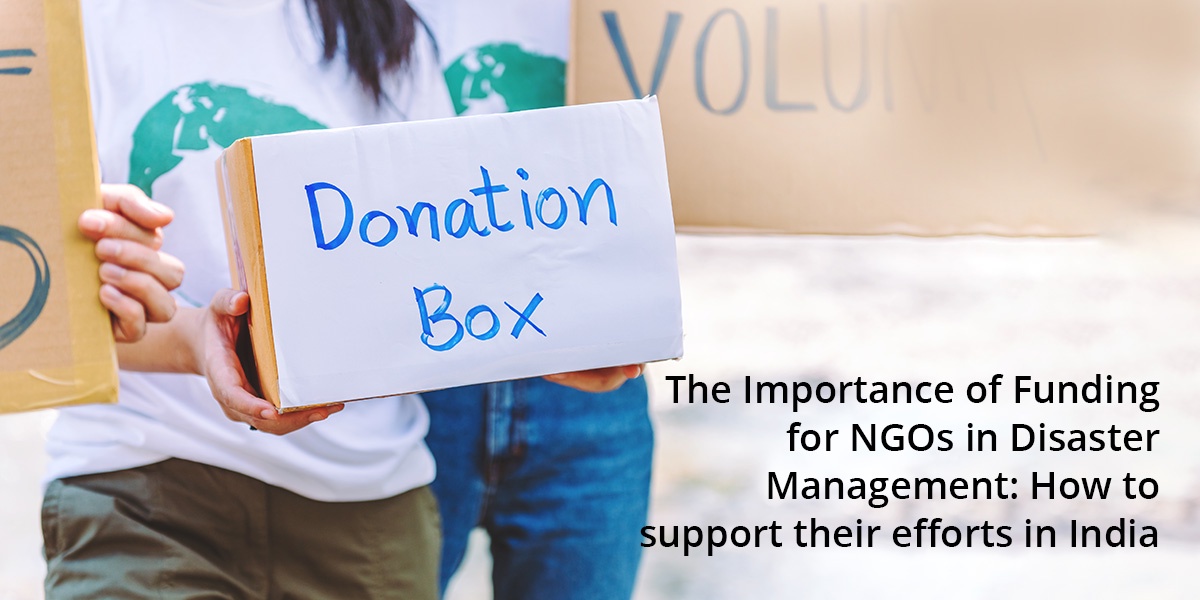Disasters can strike anywhere and anytime, and their impact can be devastating, leading to loss of life, property damage, and disruption of livelihoods. In India, where natural disasters are a regular occurrence, disaster management NGOs play a crucial role in helping communities cope with the aftermath.
Disaster management NGOs in India are non-profit organizations that provide emergency relief, rehabilitation, and long-term development support to communities affected by disasters. These NGOs work in close collaboration with the government, other NGOs, and local communities to minimize the impact of disasters and ensure a quick and effective response.
One such NGO is the Indian Red Cross Society (IRCS), which was established in 1920 and is a member of the International Federation of Red Cross and Red Crescent Societies. The IRCS has a vast network of volunteers across the country and provides first aid, disaster relief, and health services to those in need.
Another prominent disaster management NGO in India is the Goonj Foundation, which was founded in 1999 and focuses on relief and rehabilitation work in disaster-affected areas. Goonj’s flagship program, “Rahat,” provides essential relief materials such as clothes, food, and other essentials to disaster-affected communities.
The National Disaster Response Force (NDRF) is a specialized force established by the Government of India to respond to natural disasters and other emergencies. It works in close coordination with state governments and other disaster management organizations to provide search and rescue, medical aid, and relief to affected communities.
In addition to these organizations, there are many other NGOs in India that work in the field of disaster management, including Oxfam India, ActionAid India, and Save the Children India. These organizations focus on different aspects of disaster management, including relief, rehabilitation, and long-term development.
NGOs also play a critical role in building community resilience to disasters. They work with local communities to develop early warning systems, conduct disaster preparedness training, and build infrastructure that can withstand disasters. This approach not only reduces the impact of disasters but also helps communities recover quickly from them.
In conclusion, disaster management NGOs play a crucial role in helping communities cope with the aftermath of disasters in India. Their work is vital in providing emergency relief, rehabilitation, and long-term development support to affected communities. However, there are several challenges that need to be addressed to ensure that NGOs can respond effectively to disasters and build community resilience. It is essential to recognize the vital role played by these organizations and provide them with the necessary support to continue their work.
Top Disaster Management Ngo in India
Sakal Relief Fund – Sakal Relief Fund is a disaster management NGO in India that was established in 2005 by the Sakal Media Group, a leading media company based in Pune. The organization focuses on providing relief and rehabilitation to communities affected by natural disasters and other emergencies.
Indian Red Cross Society (IRCS) – Established in 1920, IRCS is a member of the International Federation of Red Cross and Red Crescent Societies. The organization has a vast network of volunteers and provides first aid, disaster relief, and health services to those in need.
Goonj Foundation – Founded in 1999, Goonj focuses on relief and rehabilitation work in disaster-affected areas. The organization’s flagship program, “Rahat,” provides essential relief materials such as clothes, food, and other essentials to disaster-affected communities.
National Disaster Response Force (NDRF) – NDRF is a specialized force established by the Government of India to respond to natural disasters and other emergencies. It works in close coordination with state governments and other disaster management organizations to provide search and rescue, medical aid, and relief to affected communities.
ActionAid India – ActionAid India focuses on disaster risk reduction and management by working with communities to develop early warning systems and disaster preparedness plans. The organization also provides relief and rehabilitation support to communities affected by disasters.
Oxfam India – Oxfam India works with communities and local partners to provide humanitarian assistance and support long-term recovery efforts after disasters. The organization also advocates for policy changes to promote disaster risk reduction and climate resilience.
These are just a few examples of the many disaster management NGOs operating in India. Each organization has its unique strengths and approaches to addressing disaster management challenges. It is essential to conduct research and due diligence before supporting any NGO to ensure that your contributions go to an organization that aligns with your values and goals.
The Importance of Funding for NGOs in Disaster Management
The significance of funding for NGOs cannot be overstated, especially when it comes to disaster management. In order to effectively prepare for and respond to disasters, NGOs require significant resources and manpower. The cost of responding to disasters is increasing exponentially due to a combination of factors, including population growth and human-caused climate change. The expenses for resources alone can exceed NGO budgets and severely hinder their operations.
Although the government does provide funding for NGOs, it comes with certain limitations. Government grants are usually offered to well-established organizations and are subject to a plethora of terms and conditions, including reporting requirements, scheduled and unscheduled check-ins, and fund tracking. Additionally, government grants often take a significant amount of time to get approved.
This is where private funding becomes essential. Private funding is beneficial for NGOs because it is not a loan and therefore does not require reimbursement. NGOs rely heavily on private funding to stay afloat, and it is typically processed faster than a government grant. In addition, private funding often comes with fewer restrictions and allows NGOs more flexibility in their disaster response efforts.
Overall, the importance of funding for NGOs in disaster management cannot be overstated. It is crucial for NGOs to have access to sufficient resources and funding to prepare for and respond to disasters effectively. Private funding, in particular, plays a critical role in enabling NGOs to carry out their vital work efficiently and expeditiously.


Comments (1)